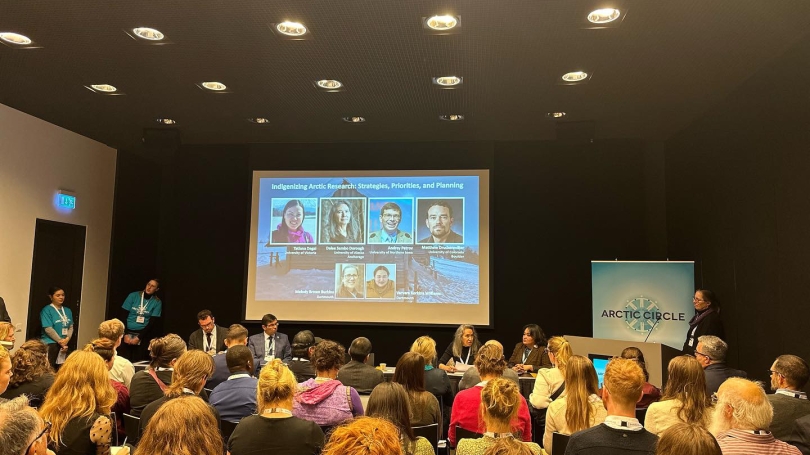
- About
- Programs
- Student Opportunities
- For Faculty
- News & Events
Back to Top Nav
Back to Top Nav
Back to Top Nav
Back to Top Nav
Back to Top Nav
A groundbreaking session at the Arctic Circle Assembly in Reykjavik, Iceland, "Indigenizing Arctic Research: Strategies, Priorities, and Planning," was held and led by a collaborative project involving five institutions: the Institute of Arctic Studies at Dartmouth College, ARCTICenter at the University of Northern Iowa, University of Alaska Anchorage, University of Colorado Boulder and University of Victoria.
The event centered dialogs advocating for more equitable, meaningful engagement of Indigenous Peoples in Arctic research, featuring Dr. Melody Brown Burkins and Varvara Korkina Williams (Kumandin) as moderators, along with a distinguished panel that included Dr. Dalee Sambo Dorough (Iñupiat), Dr. Tatiana Degai (Itelmen), Dr. Matthew Druckenmiller, and Dr. Andrey Petrov.
Tatiana Degai opened the event by presenting the concept of knowledge co-production in the Arctic, stressing the value of forging meaningful collaborations between Western and Indigenous Knowledge systems, with a key understanding that knowledge is not a commodity but a value-driven entity. This approach places prominence on the well-being of Arctic Indigenous Peoples and ecosystems, underscoring the critical need to build trust and strong relationships between researchers and Indigenous Peoples and their communities.
In a parallel vein, Dalee Sambo Dorough highlighted the historical role of Indigenous Knowledge in the context of human rights norms within the 4th International Conference on Arctic Research Planning (ICARP IV). The indigenization of Arctic research seeks to nurture a respectful synergy between science and Indigenous Knowledge, with a resolute focus on transforming Arctic research into a service that benefits both the natural world and the peoples it encompasses, through genuine collaboration with Indigenous Peoples in all phases of research decision-making processes.
Matthew Druckenmiller presented a roadmap for the ICARP IV process, revealing opportunities for Indigenous Peoples, Indigenous Knowledge holders, and scholars to actively participate. Finally, Andrey Petrov presented how the project envisions extension beyond ICARP IV into planning for the fifth International Polar Year (IPY-5), highlighting how the Indigenous-led initiative is poised to reshape Arctic and polar research planning processes. He noted the goal is to address structural inequities in representation and power, ensuring that Arctic Indigenous Peoples have a say in identifying and fulfilling their priorities.
Audience feedback during the session spotlighted the importance of these discussions for scientists, Indigenous scholars, and community members. The focus was on forging partnerships with funding agencies, academic, and governmental institutions. However, the overarching message is clear: creating spaces where Arctic Indigenous Peoples define the terms of research is paramount. The focus must be about avoiding research fatigue, preventing the exploitation and overuse of Indigenous scholars, and establishing a real, respectful balance between Western science and Indigenous Knowledge systems in Arctic research.
The future of Arctic research is taking shape, with Arctic Indigenous Peoples leading the way, ensuring that their voices are heard, recognized, respected, and integral to global, regional, national, and local solutions.